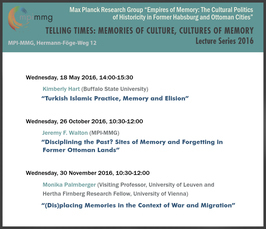“(Dis)placing Memories in the Context of War and Migration”
Telling Times: Memories of Culture, Cultures of Memory - Lecture Series 2016
- Datum: 30.11.2016
- Uhrzeit: 10:30 - 12:00
- Vortragende(r): Monika Palmberger (Visiting Professor, University of Leuven and Hertha Firnberg Research Fellow, University of Vienna)
- Monika Palmberger is Visiting Professor at the Interculturalism, Migration and Minorities Research Centre at the University of Leuven and Hertha Firnberg Research Fellow at the Department of Social and Cultural Anthropology at the University of Vienna. She earned her PhD at the University of Oxford in 2011 and thereafter has pursued postdoctoral research at the Max Planck Institute for the Study of Religious and Ethnic Diversity, Göttingen and at the Department of Social and Cultural Anthropology, University of Vienna. Her central research interests are memory, generation and the life course in contexts of war/migration. She is author/editor of three books: How Generations Remember: Conflicting Histories and Shared Memories in Post-War Bosnia and Herzegovina (Palgrave 2016), Memories on the Move: Experiencing Mobility, Rethinking the Past (with Jelena Tosic, Palgrave 2016), Caring on the Move: Ethnographic Explorations of Aging and Migration Across Societies (with Azra Hromadzic, Berghahn, forthcoming 2017).
- Ort: MPI-MMG, Hermann-Föge-Weg 12, Göttingen
- Raum: Conference Room

For more details please contact cziesielsky(at)mmg.mpg.de.
This lecture investigates processes of memory-making and memory-placing in the context of war and migration. It draws particular attention to the ways in which individuals remember, and how they manoeuvre and place their memories in public spaces that are strongly defined by national remembrance and thus undercut alternative histories. The theoretical arguments are supported by two examples: The first examines the rewriting of history and urban memory in Mostar after the 1992-95 war and the ways in which individuals position themselves in this prescribed new memorial landscape when personal and collective memories are likely to diverge. The second example explores the particular case of older labour migrants who entered Vienna as so-called ‘guest workers’ in the 1960s and 1970s. It investigates how Turkish labour migrants place their memories in Vienna’s cityscape, where the histories of guest workers are not part of public remembrance but where national remembrance of the Ottoman sieges still prevails.